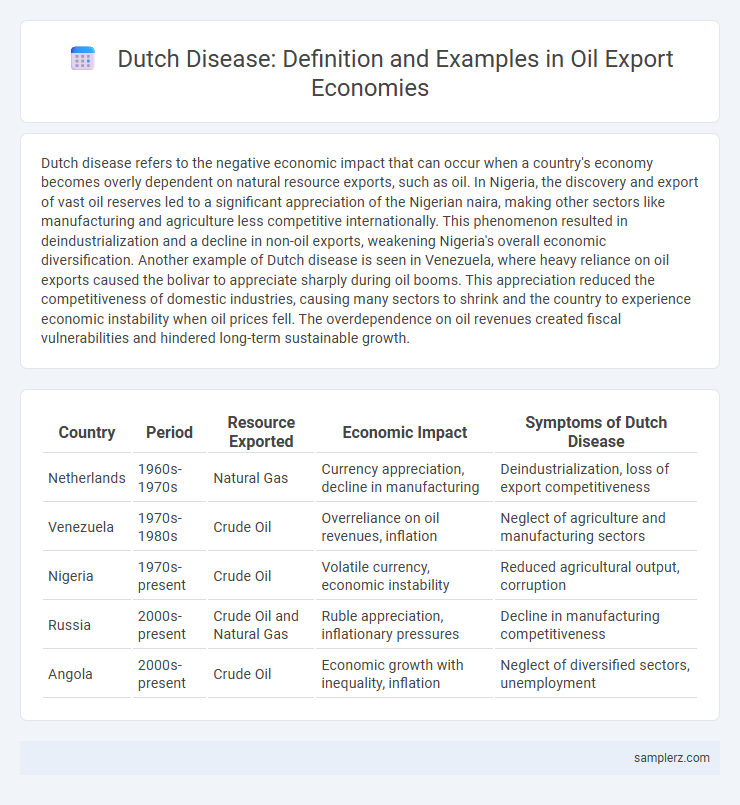Dutch disease refers to the negative economic impact that can occur when a country's economy becomes overly dependent on natural resource exports, such as oil. In Nigeria, the discovery and export of vast oil reserves led to a significant appreciation of the Nigerian naira, making other sectors like manufacturing and agriculture less competitive internationally. This phenomenon resulted in deindustrialization and a decline in non-oil exports, weakening Nigeria's overall economic diversification. Another example of Dutch disease is seen in Venezuela, where heavy reliance on oil exports caused the bolivar to appreciate sharply during oil booms. This appreciation reduced the competitiveness of domestic industries, causing many sectors to shrink and the country to experience economic instability when oil prices fell. The overdependence on oil revenues created fiscal vulnerabilities and hindered long-term sustainable growth.
Table of Comparison
| Country | Period | Resource Exported | Economic Impact | Symptoms of Dutch Disease |
|---|---|---|---|---|
| Netherlands | 1960s-1970s | Natural Gas | Currency appreciation, decline in manufacturing | Deindustrialization, loss of export competitiveness |
| Venezuela | 1970s-1980s | Crude Oil | Overreliance on oil revenues, inflation | Neglect of agriculture and manufacturing sectors |
| Nigeria | 1970s-present | Crude Oil | Volatile currency, economic instability | Reduced agricultural output, corruption |
| Russia | 2000s-present | Crude Oil and Natural Gas | Ruble appreciation, inflationary pressures | Decline in manufacturing competitiveness |
| Angola | 2000s-present | Crude Oil | Economic growth with inequality, inflation | Neglect of diversified sectors, unemployment |
Overview of Dutch Disease in Oil Exporting Economies
Dutch Disease in oil-exporting economies occurs when a resource boom, such as oil exports, leads to currency appreciation that harms other sectors like manufacturing and agriculture. This phenomenon causes a decline in non-oil exports due to reduced competitiveness and increased import dependence. Countries like Nigeria and Venezuela illustrate how oil wealth can distort economic structures, resulting in long-term vulnerabilities.
Key Symptoms of Dutch Disease in Oil-Rich Countries
Oil-rich countries often experience key symptoms of Dutch Disease, such as currency appreciation that reduces export competitiveness in non-oil sectors. This phenomenon leads to deindustrialization, where manufacturing and agriculture decline due to resource reallocation toward the booming oil sector. Elevated inflation rates and volatile government revenues further destabilize the broader economy, exacerbating dependence on oil exports.
Impact of Oil Exports on National Currency Valuation
The surge in oil exports often triggers a significant appreciation of the national currency, reducing the competitiveness of other export sectors in the economy. This currency overvaluation, characteristic of Dutch disease, leads to a decline in manufacturing and agriculture exports as they become more expensive on the global market. Countries like Nigeria and Venezuela experienced this phenomenon, where oil revenue inflows caused real exchange rate appreciation, harming economic diversification and long-term growth.
Case Study: Dutch Disease in Nigeria’s Oil Sector
Nigeria's oil export boom in the 1970s triggered Dutch Disease, causing the naira's appreciation and a decline in agricultural and manufacturing sectors. The surge in oil revenues led to resource allocation distortions, resulting in reduced competitiveness of non-oil industries and increased economic vulnerability. Policy responses emphasizing economic diversification remain critical to mitigating the long-term impact of Dutch Disease on Nigeria's economy.
Russia’s Oil Boom and the Emergence of Dutch Disease
Russia's oil boom from the early 2000s triggered a classic case of Dutch disease, where surging oil revenues led to a significant appreciation of the ruble, making non-oil exports less competitive on the global market. This currency appreciation combined with increased government spending fueled inflation and hampered diversification efforts in manufacturing and agriculture sectors. The economy's heavy reliance on oil exports has since exposed vulnerabilities to global oil price fluctuations and undermined sustainable economic growth.
Venezuela: Oil Dependence and Economic Imbalance
Venezuela's economy exemplifies Dutch disease through its heavy reliance on oil exports, which accounted for over 95% of export revenues before the market collapse. This dependence led to currency overvaluation, making non-oil sectors like agriculture and manufacturing less competitive internationally and causing economic imbalance. The resulting lack of diversification has exacerbated inflation and economic instability in Venezuela.
The Norwegian Approach to Preventing Dutch Disease
Norway's management of oil wealth through the Government Pension Fund Global (GPFG) effectively prevents Dutch disease by investing oil revenues abroad, reducing inflationary pressure and exchange rate appreciation that typically harm other export sectors. The GPFG's fiscal rule limits the annual withdrawal to a small percentage of the fund's value, maintaining economic stability and supporting diversified domestic industries. This strategic approach contrasts with economies that experience exchange rate shocks and deindustrialization after oil booms.
Effects on Non-Oil Sectors in Export-Heavy Economies
Oil export booms often lead to currency appreciation, making non-oil exports less competitive internationally and causing a decline in manufacturing and agriculture sectors. This phenomenon, known as the Dutch disease, results in reduced diversification and vulnerability to oil price fluctuations for export-heavy economies like Nigeria and Venezuela. Non-oil sectors experience capital and labor shifts toward the booming oil industry, further weakening overall economic stability.
Lessons Learned from Oil-Export Driven Dutch Disease
The Nigerian economy exemplifies Dutch disease caused by oil exports, where the surge in oil revenues led to currency overvaluation and a decline in the manufacturing sector. Lessons learned emphasize the importance of establishing sovereign wealth funds and diversifying the economy to stabilize income and reduce dependency on volatile oil markets. Effective fiscal policies and investments in non-oil sectors help mitigate the negative impacts of resource-driven exchange rate appreciation.
Policy Solutions for Mitigating Dutch Disease Risks
Policy solutions for mitigating Dutch disease risks in oil-exporting countries include establishing sovereign wealth funds to manage resource revenues and stabilize the economy. Implementing fiscal rules that limit excessive government spending prevents overheating of non-oil sectors. Diversifying the economy through investment in manufacturing and services reduces dependency on oil exports and enhances long-term economic resilience.

example of Dutch disease in oil export Infographic
 samplerz.com
samplerz.com